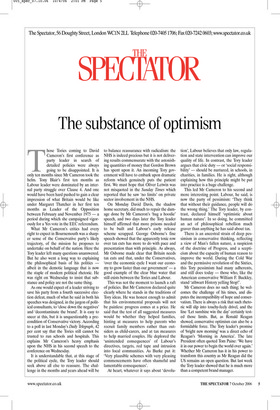The substance of optimism
Those Tories coming to David Cameron’s first conference as party leader in search of detailed policies were always going to be disappointed. It is only ten months since Mr Cameron took the helm. Tony Blair’s first ten months as Labour leader were dominated by an internal party struggle over Clause 4. And one would have been hard pushed to gain a clear impression of what Britain would be like under Margaret Thatcher in her first ten months as Leader of the Opposition between February and November 1975 — a period during which she campaigned vigorously for a Yes vote in the EEC referendum.
What Mr Cameron’s critics had every right to expect in Bournemouth was a sharper sense of the Conservative party’s likely trajectory, of the mission he proposes to undertake on behalf of the nation. Here the Tory leader left many questions unanswered. But he also went a long way to explaining the philosophical basis of his politics albeit in the demotic language that is now the staple of modern political rhetoric. He was right on Wednesday to insist that substance and policy are not the same thing.
As one would expect of a leader striving to save his party from a fourth successive election defeat, much of what he said in both his speeches was designed, in the jargon of political consultants, to ‘close down the negatives’ and ‘decontaminate the brand’. It is easy to sneer at this, but it is unquestionably a precondition of Conservative victory. According to a poll in last Monday’s Daily Telegraph, 42 per cent say that the Tories still cannot be trusted to run schools and hospitals. This explains Mr Cameron’s heavy emphasis upon the NHS in his second speech to the conference on Wednesday.
It is understandable that, at this stage of the political cycle, the Tory leader should seek above all else to reassure. The challenge in the months and years ahead will be to balance reassurance with radicalism: the NHS is indeed precious but it is not delivering results commensurate with the astonishing quantities of money that Gordon Brown has spent upon it. An incoming Tory government will have to embark upon dramatic reform which genuinely puts the patient first. We must hope that Oliver Letwin was not misquoted in the Sunday Times which reported that he saw ‘no limits’ on private sector involvement in the NHS.
On Monday David Davis, the shadow home secretary, did much to repair the damage done by Mr Cameron’s ‘hug a hoodie’ speech, and two days later the Tory leader himself affirmed that more prisons needed to be built and Labour’s early release scheme scrapped. George Osborne’s fine speech showed that the apparently toxic row over tax cuts has more to do with pace and presentation than with principle. As always, Mr Osborne made clear that Britain needs tax cuts and that, under the Conservatives, ‘over the economic cycle I want our economy to grow faster than our government’ — a good example of the clear blue water that still exists between the Tories and Labour.
This was not the moment to launch a raft of policies. But Mr Cameron declared quite clearly where he stands in the traditions of Tory ideas. He was honest enough to admit that his environmental proposals will not be painless: progress comes at a price. He said that the test of all suggested measures would be whether they helped families, hinting at measures to help parents who recruit family members rather than outsiders as child-carers, and at tax measures to help married couples. He deplored the ‘unintended consequences’ of Labour’s directives, targets, red tape and intrusion into local communities. As Burke put it: ‘Very plausible schemes with very pleasing commencements have often shameful and lamentable consequences’.
At heart, whatever it says about ‘devolu tion’, Labour believes that only law, regulation and state intervention can improve our quality of life. In contrast, the Tory leader argues that civic duty — or ‘social responsibility’ — should be nurtured, in schools, in charities, in families. He is right, although explaining how this principle might be put into practice is a huge challenge.
This led Mr Cameron to his second and more interesting point. Labour, he said, is now the party of pessimism: ‘They think that without their guidance, people will do the wrong thing.’ The Tory leader, by contrast, declared himself ‘optimistic about human nature’. In so doing, he committed an act of philosophical rebellion much graver than anything he has said about tax.
There is an ancestral strain of deep pessimism in conservative thinking, reflecting a view of Man’s fallen nature, a suspicion of the doctrine of Progress, and a scepticism about the capacity of human reason to improve the world. During the Cold War and the permissive revolution of the Sixties, this Tory pessimism had many adherents, and still does today — those who, like the American conservative William F. Buckley, stand ‘athwart History yelling Stop!’.
Mr Cameron does no such thing; he welcomes the challenge of his times, and disputes the incompatibility of hope and conservatism. There is always a risk that such rhetoric will slip into touchy-feely drivel, and the line ‘Let sunshine win the day’ certainly tested those limits. But, as Ronald Reagan showed, conservative optimism can also be a formidable force. The Tory leader’s promise of ‘bright new morning’ was a direct echo of Reagan’s ‘Morning in America’. The late President often quoted Tom Paine: ‘We have it in our power to begin the world over again.’ Whether Mr Cameron has it in his power to transform this country as Mr Reagan did the US remains an open question. But last week the Tory leader showed that he is much more than a competent brand manager.


















































































 Previous page
Previous page